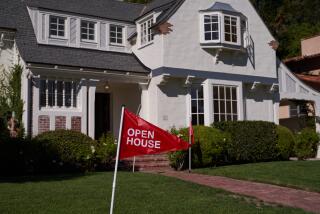Sales of New Homes Up 4.9%; Weather Cited
- Share via
WASHINGTON — Sales of new, single-family homes posted their biggest gain in seven months during January, the government reported Thursday, but analysts attributed the 4.9% increase in part to unusually mild winter weather.
Sales reached a seasonally adjusted annual rate of 704,000 in January, after a 2% increase in December, the Commerce Department said. New sales were bolstered by strong activity in the Midwest.
Dave Seiders, chief economist for the National Assn. of Home Builders, said much of January’s increase probably occurred because warm weather brought more people out to shop for homes, borrowing sales from future months.
The increase also may reflect a temporary dip in mortgage rates during the month, which gave home buyers a “window of opportunity to move into the market,” Seiders said.
Rising Rates Predicted
January’s strong showing aside, analysts are still forecasting a decline in construction of single-family homes this year, based on expectations that mortgage rates will rise during the first half of 1989 and the economy will slow.
New home sales had edged up a slim 0.9% during 1988 after plunging 10.5% in 1987, when the drop was blamed on increased interest rates and a slowdown in demand after five strong sales years.
After temporarily sliding during January, fixed-rate home mortgages resumed their climb in February and last week were averaging 10.78%, up from 9.87% a year earlier, according to a national survey by the Federal Home Loan Mortgage Corp.
Economists predict that rates could reach 12% this year, although the increasing popularity of adjustable-rate mortgages that offer lower initial interest rates could mitigate damage to the single-family housing market.
As the Federal Reserve Board continues to push up interest rates in an effort to slow economic growth and restrain inflation, higher rates “are really going to bite into the housing market,” said economist Richard Peach of the Mortgage Bankers Assn.
“We are going to start to see some modest declines in housing market activity once we get the numbers for March, April and May,” Peach predicted.
Seiders said that with financial troubles plaguing the nation’s savings and loans, which are the largest lenders of adjustable-rate mortgages, “we’re kind of worried about the funds situation as we go out through 1989.”
Median Price Slips
January’s increase in home sales was the biggest monthly jump since a 5.4% increase last June.
The strength was concentrated in the Midwest, where sales rose 22.2% to a seasonally adjusted annual rate of 110,000.
Seiders said the increase was largely because of mild weather in that region, although the Midwest’s housing market also has been aided by the strength of manufacturing industries experiencing rising export sales.
Sales last month were up 8% in the West and rose 0.9% in the Northeast but declined 1.9% in the South.
The median price for a new home, meanwhile, declined 6.9% in January to $113,000, meaning that half the homes sold for more and half for less. The average price, which is pulled up by sales of very expensive homes, was down 8.2% to $137,100.
More to Read
Inside the business of entertainment
The Wide Shot brings you news, analysis and insights on everything from streaming wars to production — and what it all means for the future.
You may occasionally receive promotional content from the Los Angeles Times.










